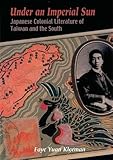Under an Imperial Sun : Japanese Colonial Literature of Taiwan and the South / Faye Yuan Kleeman.
Material type: TextPublisher: Honolulu : University of Hawaii Press, [2003]Copyright date: ©2003Description: 1 online resource (328 p.)Content type:
TextPublisher: Honolulu : University of Hawaii Press, [2003]Copyright date: ©2003Description: 1 online resource (328 p.)Content type: - 9780824825928
- 9780824865375
- 895.609951249 22
- PL889.T282 K57 2003eb
- online - DeGruyter
- Issued also in print.
| Item type | Current library | Call number | URL | Status | Notes | Barcode | |
|---|---|---|---|---|---|---|---|
 eBook
eBook
|
Biblioteca "Angelicum" Pont. Univ. S.Tommaso d'Aquino Nuvola online | online - DeGruyter (Browse shelf(Opens below)) | Online access | Not for loan (Accesso limitato) | Accesso per gli utenti autorizzati / Access for authorized users | (dgr)9780824865375 |
Frontmatter -- Contents -- Acknowledgments -- Introduction: Imperialism and Textuality -- Part I. Writing the Empire -- 1. The Genealogy of the "South" -- 2. Taming the Barbaric -- 3. Writers in the South -- Part II .Colonial Desire and Ambivalence -- 4. Nishikawa Mitsuru and Bungei Taiwan -- 5. Gender, Historiography, and Romantic Colonialism -- Part III. The Empire Writes Back -- 6. Language Policy and Cultural Identity -- 7. The Nativist Response -- 8. Imperial-Subject Literature and Its Discontents -- Conclusion: A Voice Reclaimed -- Epilogue: Postcolonial Refractions -- Notes -- Bibliography -- Index -- About the Author
restricted access online access with authorization star
http://purl.org/coar/access_right/c_16ec
Under an Imperial Sun examines literary, linguistic, and cultural representations of Japan's colonial South (nanpô). Building on the most recent scholarship from Japan, Taiwan, and the West, it takes a cross-cultural, multidisciplinary, comparative approach that considers the views of both colonizer and colonized as expressed in travel accounts and popular writing as well as scholarly treatments of the area's cultures and customs. Readers are introduced to the work of Japanese writers Hayashi Fumiko and Nakajima Atsushi, who spent time in the colonial South, and expatriate Nishikawa Mitsuru, who was raised and educated in Taiwan and tried to capture the essence of Taiwanese culture in his fictional and ethnographic writing. The effects of colonial language policy on the multilingual environment of Taiwan are discussed, as well as the role of language as a tool of imperialism and as a vehicle through which Japan's southern subjects expressed their identity--one that bridged Taiwanese and Japanese views of self. Struggling with these often conflicting views, Taiwanese authors, including the Nativists Yang Kui and Lü Heruo and Imperial Subject writers Zhou Jinpo and Chen Huoquan, expressed personal and societal differences in their writing. This volume looks closely at their lives and works and considers the reception of this literature--the Japanese language literature of Japan's colonies--both in Japan and in the former colonies. Finally, it asks: What do these works tell us about the specific example of cultural hybridity that arose in Japanese-occupied Taiwan and what relevance does this have to the global phenomenon of cultural hybridity viewed through a postcolonial lens?
Issued also in print.
Mode of access: Internet via World Wide Web.
In English.
Description based on online resource; title from PDF title page (publisher's Web site, viewed 02. Mrz 2022)


